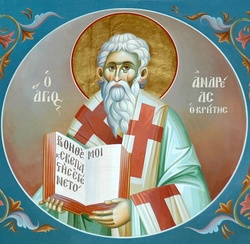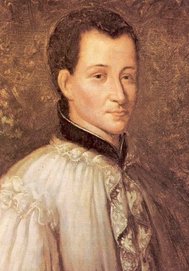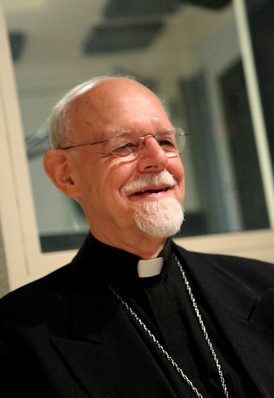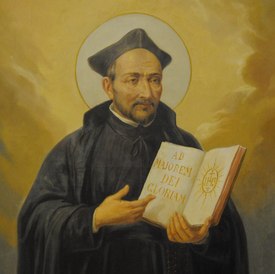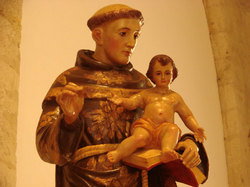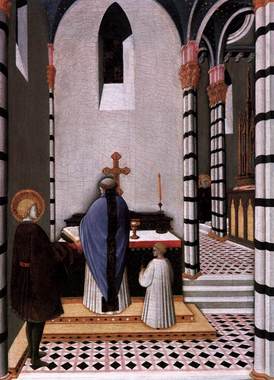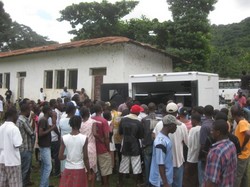Yes, it is possible to be wed at the Basilica of Saint Peter’s –the Vatican– but there’s a lot of paperwork and advanced planning. I am sure it is a beautiful experience. Watch the video clip.
Blessed Nicholas Paglia
O Lord, you gave Blessed
Nicholas a special grace for preaching your word and for
obtaining the salvation of his neighbors. With the help of his prayers may we stand
firm in that same holy calling.
Clean Monday…getting into Great Lent
For Eastern Catholic and Orthodox Christians, today is “Clean Monday,”
the first day of the Great Fast. In many of these churches, the faithful will
gather tonight for the service of Compline with the singing of a portion of the
“Penitential Canon,” also known as the “Great Canon of St.
Andrew of Crete.” The First Ode of the Great Canon uses as a springboard
the text of the Canticle of Moses contained in Exodus 15: 1-19. The
singing of the Great Canon in the First Week of the Great Fast, is intended to
invoke compunction in the penitent heart.
(Irmos) A Helper
and Protector has become salvation to me.
This is my God; I
will glorify Him.
God of my fathers,
I will exalt Him;
for in glory has He
been glorified!
Refrain
Glory to You, our
God, glory to You! (or the refrain changes to “Have mercy on me, O God,
have mercy on me!” when sung at Compline in the first of the Fast)
Where shall I begin
to lament the deeds of my wretched life?
What first-fruits
shall I offer, O Christ, for my present lamentation?
But in your
compassion, grant me release from my sins.
Glory to You…
Come, wretched
soul,
with your flesh
confess to the Creator of All.
In future, refrain
from your former brutishness
and offer to God
tears in repentance.
Glory to You…
Having rivaled the
first-made Adam in my transgressions,
I realize that I am
stripped naked of God
and of the
everlasting kingdom of bliss through my sins.
Glory to You…
Alas, wretched
soul!
Why are you like
the first Eve?
For you have
wickedly looked and been bitterly wounded,
and you have
touched the tree
and rashly tasted
the forbidden fruit. (cf Gen. 3:6)
Glory to You…
The place of bodily
Eve has been taken
by the Eve of my
mind,
in the shape of a
passionate thought in the flesh,
showing me sweet
things
yet ever making me
taste bitter things.
Glory to You…
Adam was rightly
exiled from Eden
for not keeping
Your one commandment.
O Savior, what
shall I suffer,
who am always rejecting
Your living words? (cf. Gen. 3:26/Acts 7:38)
Glory to the Father
and to the Son and to the Holy Spirit!
Trinity adored in
Unity,
take from me the
heavy yoke of sin,
and in Your
compassion,
grant me tears of
compunction.
Now and ever and
forever. Amen.
O Theotokos,
hope and
intercessor of those who sing to you,
take from me the
heavy yoke of sin,
and as you are our
pure Lady,
accept me that
repents.
(KATAVASIA) A
Helper and a Protector is He unto salvation.
He is my God, and I
glorify Him;
God of my fathers,
and I magnify Him,
for He is greatly
glorified.
Saint Claude la Colombiere
I have found a person after my own heart who will put into action all that I desire.
With the Church we pray:
Lord and Father of us all, You spoke to Saint Claude, Your faithful servant, in the silence of his heart, so that he might bear witness to the riches of Your love. May Your gifts of grace continue to enlighten and console Your Church.
Bishop Peter A. Rosazza celebrates his 75th birthday
Bishop Peter Anthony Rosazza, an auxiliary bishop of the Archdiocese of Hartford, celebrates his 75th birthday today.
Our prayers are with him as he makes this milestone.
Bishop Rosazza was ordained a bishop in 1978 (31 yrs a bishop) at the age of 43 by the great Archbishop John Francis Whealon.
Since I am from New Haven, Bishop Peter (as he’s known) is a legendary character. For one, he confirmed me in 1982 at Saint Stanislaus Church (New Haven, CT) and he’s been a tireless advocate for those living on the margins of society (the poor, the immigrant, the widow).
He’s been known as a good preacher of the Gospel and attentive teacher of the faith. Significantly, Bishop Peter is also been a friend to the Communion and Liberation group of New Haven for which are we deeply grateful.
Happy 75th birthday Bishop Peter!
Blessed Jordan of Saxony
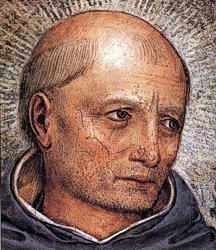 My words that I have in your mouth, says the Lord, will never be absent from your lips, and your gifts will be accepted on my altar.
My words that I have in your mouth, says the Lord, will never be absent from your lips, and your gifts will be accepted on my altar.
Leading the soul to God by the method of the Ignatian Spiritual Exercises
I came across this entry in an old encyclopedia. In its brevity a lot of truth is revealed: we can work (asceticism) by reason, and the heart, to union with God. Consider for a second what the author, Fr Drum, has to teach. Also, remember that Ignatian spirituality is not the same as Jesuit spirituality. The two are not the same by any stretch of the imagination. Fr Drum tells us that it is possible through prayer and good spiritual direction to know, love and serve God in this world so as to do the same in the next. Many people today don’t have the confidence that knowing and loving and serving God is possible at all. Some don’t know that God wants our happiness today –in this life–that there is meaning to our life that includes suffering and love (& joy) and some reject the notion that we are oriented toward a final goal. Christians call this goal heaven, the Beatific vision, communion with the Trinity, etc. What else is there for the Christian who really prays and lives his or her life with the Gospel and with reason? I get the sense that they don’t have the certainty that God knows us personally and intimately, never mind having a relationship with bodiless being.
I spent many years being formed by Ignatian Spirituality. My personal, cultural, ecclesial life (taken as a unity) is informed by what Saint Ignatius of Loyola proposed in his Spiritual Exercises. But I would not be telling the whole truth if I didn’t say that other influences have had a strong influence in how I look at my life and life’s work today. My life intersects with Monsignor Luigi Giussani, Chiara Lubich, Saint Josemaria Escriva, Saints Francis & Dominic and Saint Benedict and this school of the Lord’s service. The host of women saints and blesseds are too cumbersome to note here. The point, however, is not my interpretative lens except to say that I have benefited from the Spiritual Exercises and perhaps you might think the same if you gave the Exercises a chance. They are clearly an apostolic method in the spiritual life with an incredibly strong contemplative aspect. The Exercises are not for everyone, so be patient with them if you attempt to do an Ignatian retreat.
Ultimately, what the author of this entry names as the goal of the Christian life is my own, regardless of the influences: To live is Christ. It is entirely consistent with the motto of my coat of arms seen above: sequela Christi (to follow Christ). Ignatius (and the other spiritual masters noted above) could not conceive of life any differently. Would that be the same for all people!
The entry:
The spirit of Saint Ignatius was Pauline, — intrepid yet tender; motivated by two great principles,–love of Jesus Christ and zeal for the salvation of souls. These two principles were brought together in his motto: A. M. D. G., “Omnia ad Majorem Dei Gloriam” (All for the greater glory of God). It was this spirit, which breathed in “The Spiritual Exercises,” a method of asceticism, that is the very soul of the constitutions and activities of the Society of Jesus.
This little book is said to have converted more souls than it contains letters.
Certainly the results it has produced down the centuries cannot be exaggerated. The importance of its method is proved by the mere fact that 292 Jesuit writers have commented on the whole work. The purpose of the Exercises is definite and scientific upbuilding of the reason, will and emotions, by meditation and contemplation on the fundamental principles of the spiritual life and by other exercises of the soul. First, God is rated rightly as the soul’s end and object.
Reason is convinced that God is the end for which the soul is created, and all things else are only means to bring the soul to God; hence it follows that that is good which leads the soul Godward, and that is evil which leads the soul awayward from God.
The soul’s awaywardness from God results in sin; so sin is studied both in itself and in its consequences to the soul. Secondly, Jesus Christ is put in His place in the soul, by meditations on His ideals and contemplations on His private and public life.
The soul now aspires to the very height of enthusiastic and personal love to Him; and to the most self-sacrificing generosity in following the evangelical counsels.
Thirdly, the high resolves of the soul are confirmed by the imitation of Christ in His passion. Lastly, the soul rises to a sublime and unselfish joy, purely because of the glory of its risen Lord; and leaps with rapturous exultation into the realms of unselfish and perfect love of God, such as Saint Paul evinced when he cried out: “To me, to live is Christ; to die were gain” (Philippians 1, 21).
Fr Walter Drum, SJ
The Encyclopedia Americana, 1919
New Benedictine Abbey in Oklahoma
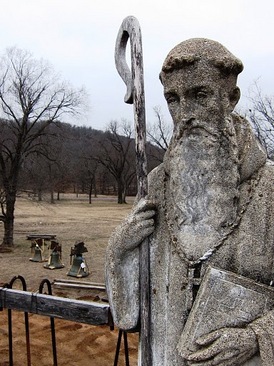 Yesterday was the feast of Saint Scholastica, the twin sister of Saint Benedict but today Father Abbot Antoine of the Abbey Our Lady of Fontgombault announced that Our Lady of the Annunciation of Clear Creek Monastery is now an abbey.
Yesterday was the feast of Saint Scholastica, the twin sister of Saint Benedict but today Father Abbot Antoine of the Abbey Our Lady of Fontgombault announced that Our Lady of the Annunciation of Clear Creek Monastery is now an abbey.
Prayer as love in light of Saint Anthony of Padua
I present the Wednesday (February 10, 2010) Address of Pope Benedict on Saint Anthony of Padua, following upon his talks on Saints Francis and Dominic in the past weeks. What is a stake here for the Pope? It is being centered totally on Jesus Christ. Nothing else matters. Prayer, a relationship of love with God is a constant. As the pope will note below, you can’t make progress in the spiritual life if you do not pray and live a life of virtue.
And now, the pope…
After presenting two weeks ago the figure of Francis of Assisi, this morning I would like to speak about another saint belonging to the first generation of Friars Minor: Anthony of Padua or, as he is also called, of Lisbon, referring to his native city. He is one of the most popular saints in the whole Catholic Church, venerated not only in Padua, where a splendid basilica was built, which houses his mortal remains, but in the whole world. Dear to the faithful are images and statues that represent him with the lily, symbol of purity, or with the Child Jesus in his arms, in memory of a miraculous apparition mentioned in some literary sources.
Anthony contributed in a significant way to the development of Franciscan spirituality, with his outstanding gifts of intelligence, balance, apostolic zeal and, mainly, mystical fervor.
He was born in Lisbon of a noble family around 1195 and was baptized with the name Fernando. He entered the canons who followed the monastic rule of St. Augustine, first in the monastery of St. Vincent in Lisbon, and subsequently in that of the Holy Cross in Coimbra, renown cultural center of Portugal. He dedicated himself with interest and solicitude to the study of the Bible and of the Fathers of the Church, acquiring that theological science that he made fructify in the activities of teaching and preaching.
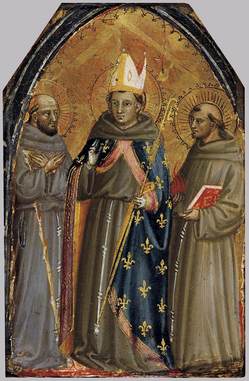
The episode that marked a decisive change in his life took place in Coimbra: In 1220 the relics were exposed there of the first five Franciscan missionaries who had gone to Morocco, where they met with martyrdom. Their case aroused in young Fernando the desire to imitate them and to advance in the way of Christian perfection: He then asked to leave the Augustinian canons and become a Friar Minor. His request was accepted and, taking the name Anthony, he also left for Morocco, but Divine Providence willed otherwise. As the consequence of an illness, he was obliged to return to Italy and, in 1221, he took part in the famous “Chapter of the mats” in Assisi, where he also met St. Francis. Subsequently, he lived for a time totally hidden in a convent near Forli, in the north of Italy, where the Lord called him to another mission. Invited, by totally accidental circumstances, to preach on the occasion of a priestly ordination, he showed he was gifted with such learning and eloquence that the superiors destined him to preaching. Thus he began in Italy and France such an intense and effective apostolic activity that he induced not a few persons who had separated from the Church to retrace their steps. He was also among the first teachers of theology of the Friars Minor, if not even the first. He began his teaching in Bologna, with Francis’ blessing who, recognizing Anthony’s virtues, sent him a brief letter with these words:
“I would like you to teach theology to the friars.” Anthony set the foundations of Franciscan theology that, cultivated by other famous figures of thinkers, came to its zenith with St. Bonaventure of Bagnoregio and Blessed Duns Scotus.
Becoming provincial superior of the Friars Minor of northern Italy, he continued with the ministry of preaching, alternating that with administrative tasks. When his mandate as provincial came to an end, he retired near Padua where he had already been other times. Barely a year later, he died at the gates of the city on June 13, 1231. Padua, which in life had received him with affection and veneration, showed him forever honor and devotion. Pope Gregory IX himself, after hearing him preach, described him as the “Arc of the Testament,” and canonized him in 1232, also as a result of the miracles that happened through his intercession.
In the last period of his life, Anthony committed to writing two series of “Sermons” titled, respectively, “Sunday Sermons” and “Sermons on the Saints,” written for preachers and professors of theological studies of the Franciscan Order. In them he comments on the texts of sacred Scripture presented by the liturgy, using the Patristic Medieval interpretation of the four meanings: the literal or historical, the allegorical or Christological, the tropological or moral, and the anagogic, which guides to eternal life. They are theologic-homiletic texts, which take up the lively preaching in which Anthony proposes a true and proper itinerary of Christian life. The wealth of the spiritual teachings contained in the “Sermons” is such that, in 1946, the Venerable Pope Pius XII proclaimed Anthony a doctor of the Church, attributing to him the title of “Evangelic Doctor,” because from these writings arises the freshness and beauty of the Gospel; even today we can read them with great spiritual profit.
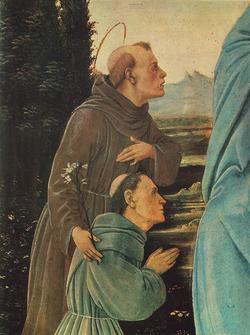
In them, he speaks of prayer as a relationship of love, which drives man to converse sweetly with the Lord, creating an ineffable joy, which gently envelops the soul in prayer. Anthony reminds us that prayer needs an atmosphere of silence, which is not the same as withdrawal from external noise, but is an interior experience, which seeks to remove the distractions caused by the soul’s preoccupations. According to the teaching of this distinguished Franciscan doctor, prayer is made up of four indispensable attitudes which, in Anthony’s Latin, are described as: obsecratio, oratio, postulatio, gratiarum actio. We could translate them thus: to open one’s heart confidently to God, to speak affectionately with him, to present to him our needs, to praise him and to thank him.
In this teaching of St. Anthony on prayer we see one of the specific features of Franciscan theology — of which he was the initiator — namely, the role given to divine love, which enters in the sphere of affection, of the will, of the heart and which is also the source from which springs a spiritual knowledge that surpasses all knowledge.
Anthony writes: “Charity is the soul of faith, makes it alive; without love, faith dies” (Sunday and Holy Days Sermons II, Messagero, Padua, 1979, p. 37).
Only a soul that prays can make progress in the spiritual life: this is the privileged object of St. Anthony’s preaching. He knows well the defects of human nature, the tendency to fall into sin; that is why he constantly exhorts to combat the inclination to covetousness, to pride, to impurity and to practice the virtues of poverty and generosity, of humility and obedience, of chastity and purity. At the beginning of the 13th century, in the context of the rebirth of the cities and the flourishing of trade, there was an increased number of people who were insensitive to the poor. Because of this, Anthony many times invites the faithful to think of true wealth, that of the heart, which, making them good and merciful, makes them accumulate treasures for Heaven. “O rich people,” he exhorts, “befriend… the poor, welcome them in your homes: They will then be the ones who receive you in the eternal tabernacles, where the beauty of peace is, the confidence of security, and the opulent quiet of eternal satiety” (Ibid., p. 29).
Is not this perhaps, dear friends, a very important teaching also today, when the financial crisis and the serious economic imbalances impoverish not a few persons and create conditions of misery? In my encyclical Caritas in Veritate, I remind that: “The economy needs ethics in order to function correctly — not any ethics whatsoever, but an ethics which is people-centred” (No. 45).
In Francis’ school, Anthony always puts Christ in the center of life and thought, of action and preaching. This is another typical feature of Franciscan theology: Christ-centeredness. Willingly [this theology] contemplates and invites to contemplate the mysteries of the Lord’s humanity, in a particular way, that of the Nativity, which arouse feelings of love and gratitude toward divine goodness.
Also the vision of the Crucified inspires in him thoughts of gratitude to God and of esteem for the dignity of the human person, so that all, believers and non-believers, can find a meaning that enriches life. Anthony writes: “Christ, who is your life, is hanging before you, because you look at the cross as in a mirror. There you will be able to know how mortal were your wounds, which no medicine but that of the blood of the Son of God could have cured. If you look well, you will realize how great are your human dignity and your value … In no other place can man realize better how much he is worth, but by looking at himself in the mirror of the cross” (Sunday and Holy Days Sermons III, p. 59).
Grace happens in Haiti
Hôpital Sacré Coeur each year. Since the earthquake we have had over 250 and will continue to have at least 50 a week for the next 2 months. The list of people wanting to volunteer grows each day. This is proof for all of us that the majority of people are caring and want to help their fellow man. We need to remember this as we read and hear the negative in the media.
Hôpital Sacré Coeur happen.
